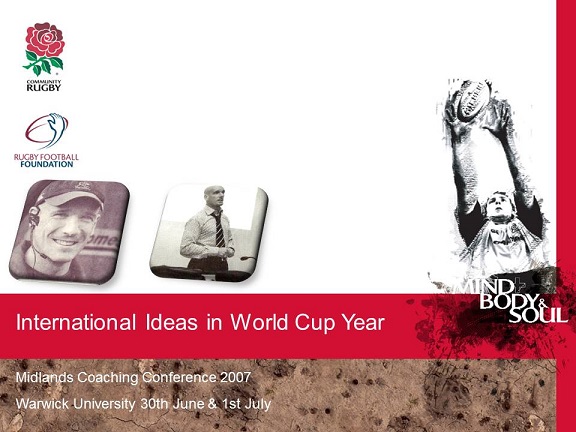Emotional Intelligence and coaching style – For Coaches & Coaching Can it make the difference?
The difference?
- IQ – “fixed” (115 – 135)choose your parents carefully!
- EQ – intelligence that can be grown
- Examples
- Wilkinson world cup – emotional control?
- Brian Moore: France v England – 1994 emotional manipulation?
What is emotional intelligence? Is it about ourselves or others?
The capacity for recognizing our own feelings and those of others, for motivating ourselves, and for managing emotions well in ourselves and others
The Competency Framework
Self-Awareness :
- Emotional Self-Awareness
- Accurate Self-Assessment
- Self-Confidence
Social Awareness :
- Empathy
- Organisational Awareness
- Service Orientation
Self-Management :
- Emotional Self-Control
- Transparency
- Adaptability
- Achievement Orientation
- Initiative
- Optimism
Relationship Management :
- Developing Others
- Inspirational Leadership
- Change Catalyst
- Influence
- Conflict Management
- Teamwork & Collaboration
EQ competencies = Outstanding Performance
- Outstanding performers (the difference)
- 67% are EQ competencies
- 33% cognitive or technical skills
- EQ drives two- thirds of outstanding performance
- Twice the weight of technical skills!
Relationship?
- Where does it fit into the coaching approach?
- Is it a priority?
- As a coach do you need to be liked?
- value your Relationship on a scale of 1 to 10…
- 1 ~ Insignificant 10 ~ Essential
What makes for a good coaching session? – TEST
- 5 key points
- 3’s
- Winning team
- Losing team
Coaching styles – TEST
- What about if coach & player has different styles ?
- Sven Goran E- strengths/weakness‘
- Clive Woodward -strength /weakness’
- Arsene Wenger – strength /weakness’
Where did you learn best–Looking back? – TEST
- What made a positive learning experience for you?
- What were your feelings?
- What were your thoughts?
- What was the teacher/coach doing or not doing?
- What was the best learning environment for you?
- (Discussion & feedback)
What were the negative experiences? – TEST
Specific memories
- Consider- who? how? Why?
- What did you learn from experience?
POSITIVE
- FEELING Important : Worthy (self esteem) : Kindness: Encouraged: Liked: Respected
- Given Time (Illusion of time)
- No power imbalance
- Gentle humour
- Understanding – Good empathy/situation
Positive contd.
- Good body language – facial expression, eye contact, hello/ bye
- When coach had ~ Good self image- was calm & confident-appeared secure and happy- was interested (personal & professional)
- Optimistic (contagious emotions)
- Was a real person ~ admitted mistakes
NEGATIVE
- Abusive /HUMILIATION
- Blame culture / Shouting
- Not protected / Sarcasm
- Judgemental
- Instilled fear (of failure)
- Confused (consistency & instructions)
- Not interested
Simple tips – TEST
- Go one to one
- Use I and first name (real name/ nickname?)
- Positive strokes 20:1
- Build self value (esteem & confidence)
Self Value -the 3 components – TEST
- Image ~ Identity:
- Are you proud & pleased to be you?
- Personal Belonging:
- Do you know that you are missed when not around?
- Personal Power:
- Do you believe** that you can influence the world around you?
Beliefs
- Those that believe they can – can
- Those that believe they can’t – can’t
- And they are both right!
- Henry Ford
- The four minute mile (physical or emotional capacity?)
EQ Common Sense?
- “Me havin’ no education, I had to use my brains” Bill Shankly
- “Nor do I believe in bombarding them with motivational stuff all the time. If you don’t ration your interventions what you say evaporates” Alex Ferguson
- EQ starts with us not with players
The bottom line!
- Be yourself {knowledge}
- Be confident
- Keep it simple
- Adopt a variety of approaches
- Positive is best!
